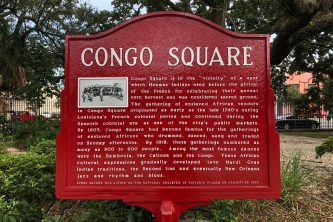Private African-American New Orleans Tour
Tour Details
New Orleans – the city with the most profound African heritage in the Northern Hemisphere. The tour starts at the Mississippi River, where the city was founded in 1718 and where the first two slave ships arrived in 1719. The river is the site where Jeanne Marie Aliquot, while disembarking from France, was rescued from the Mississippi River by a black fisherman; because the Ursuline Order would not accept black nuns, Aliquot eventually helped facilitate the founding of St. Augustine Catholic Church, where the second oldest order of African-American nuns, the Sisters of the Holy Family, took their vows. This is also where Marcus Garvey was deported in 1927.
You will visit the Royal Orleans Hotel, site of the former St. Louis Exchange, the antebellum South’s largest slave market, and the Bourbon Orleans Hotel, site of the Quadroon balls, as well as the convent of the Sisters of the Holy Family. See the sites where early Civil Rights newspapers L’Union and The Tribune were published.
Next, you’ll see Congo Square, site of African slave gatherings, the only place in North America where enslaved Africans were allowed to gather and where pure West African religious ritual occurred. Then, you will move on to St. Augustine’s Catholic Church, oldest African-American Catholic parish in the nation, and the Tomb of the Unknown Slave.
Also included are St. Louis Cemeteries #1 and #2, the site of significant African-American history. St. Louis #1 includes the tombs of Civil Rights pioneer Homer Plessy, Civil Rights activist-publisher Dr. Louis Charles Roudanez, Voodoo Queen Marie Laveau, Jazz dynasty Barbarin Family, and New Orleans’ first African-American mayor Dutch Morial. St. Louis #2 features music legends Danny Barker and Ernie K-Doe, and St. Louis #2 Square #3 features what historian Joe Logsdon called “the world’s greatest collection of memorials to African American achievement.” Square #3 is the final resting place of the Sisters of the Holy Family; education patroness Marie C. Couvent; first African American Civil war hero Andre Cailloux; first African-American lieutenant governor Oscar James Dunn; legendary military drummer Jordan Noble; and Civil Rights publisher Jean Baptiste Roudanez.


